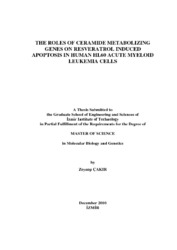Please use this identifier to cite or link to this item:
https://hdl.handle.net/11147/3062| Title: | The Roles of Ceramide Metabolizing Gennes on Resveratrol Induced Apoptosis in Human Hl60 Acute Myeloid Leukemia Cells | Authors: | Çakır, Zeynep | Advisors: | Baran, Yusuf | Publisher: | Izmir Institute of Technology | Abstract: | Resveratrol (3,5,4' -trihydroxy-trans-stilbene) is naturally occurring phytoalexin, which presents especially in grapes. It is a potential anticancer agent which inhibits tumor initiation, promotion, and progression. Ceramides are the central compounds of sphingolipids metabolism. They are known as second messengers regulating various cellular processes including cell growth, proliferation, differentiation and apoptosis. While ceramide acts as a strong apoptotic molecule, glucosylceramide (GluCer) and sphingosine-1-phosphate (S1P) trigger cell growth and proliferation and inhibit apoptosis. Sphingosine kinase-1 (SK-1) is an enzyme catalyzing the phosphorylation of sphingosine to sphingosine-1-phosphate while glucosylceramide synthase (GCS) converts ceramide to glucosylceramide. Thus, inhibition of GCS by N-(2-hydroxy-1-(4-morpholinylmethyl)-2-phenylethyl)-decanamide, hydrochloride (PDMP) or SK-1 by sphingosine kinase-1 inhibitor, or exogenous application of ceramide analog (C8:ceramide) results in increased accumulation of ceramides. The aim of the study is to examine the roles of ceramide, glucosylceramide and sphingosine-1-phosphate in resveratrol induced apoptosis in HL60 cells. In this study, it was demonstrated cytotoxic effects of resveratrol on human acute myeloid leukemia cells in addition to identify a novel mechanism of resveratrol-induced apoptosis by targeting ceramide metabolism. And also it was shown that via targeting ceramide-generating and/or ceramide-clearance genes provided ceramide generation and/or accumulation in response to resveratrol treatment. This study showed for the first time that there were significant induction of apoptosis through increasing intracellular concentrations of ceramides in resveratrol treated HL60 cell. Taking together all these results showed that ceramides may be involved in resveratrol-induced apoptosis. | Description: | Thesis (Master)--Izmir Institute of Technology, Molecular Biology and Genetics, Izmir, 2010 Includes bibliographical references (leaves: 43-49) Text in English; Abstract: Turkish and English xi, 49 leaves |
URI: | http://hdl.handle.net/11147/3062 |
| Appears in Collections: | Master Degree / Yüksek Lisans Tezleri |
Files in This Item:
| File | Description | Size | Format | |
|---|---|---|---|---|
| T000891.pdf | MasterThesis | 1.7 MB | Adobe PDF |  View/Open |
CORE Recommender
Page view(s)
234
checked on Apr 14, 2025
Download(s)
96
checked on Apr 14, 2025
Google ScholarTM
Check
Items in GCRIS Repository are protected by copyright, with all rights reserved, unless otherwise indicated.